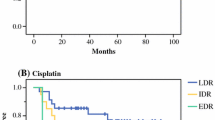Abstract
Purpose
Our aim was to evaluate the utility of in vitro drug sensitivity testing in patients with peritoneal surface malignancies undergoing cytoreductive surgery (CRS) plus hyperthermic intraperitoneal chemotherapy (HIPEC).
Methods
We found data for 27 patients who underwent CRS plus HIPEC from September 2009 to May 2012 and whose tumors were submitted for in vitro drug sensitivity (ChemoFx®). Intraperitoneal chemotherapy agents included mitomycin C, cisplatin + doxorubicin, or cisplatin alone.
Results
There were 12 (44.4 %) appendiceal adenocarcinomas, 5 (18.5 %) colon cancers, 4 (14.8 %) sarcomas, 3 (11.1 %) ovarian cancers, 2 (7.4 %) mesotheliomas, and one (3.7 %) gastric cancer. In all, 15 patients (55.5 %) underwent complete cytoreduction (CC ≤ 1). Seventeen tumors (63 %) displayed in vitro sensitivity to the agents used. Mean overall (OS) and progression-free (PFS) survivals for the entire group were 34.4 ± 4.5 months (median 41 months) and 12.5 ± 2.1 months (median 8 months), respectively. There were no significant differences in OS and PFS for patients whose tumors displayed in vitro drug sensitivity versus those whose tumors did not (p = 0.101 and p = 0.403, respectively). These results also did not differ when evaluating only the patients who underwent complete cytoreduction. In vitro, the drug sensitivity did not correlate with primary tumor pathology or preoperative systemic chemotherapy administration. In vitro drug sensitivity correlated with the drug used at the time of HIPEC (p = 0.003). None of the tumors tested showed in vitro sensitivity to cisplatin and/or doxorubicin. Eight nonresponsive tumors, however, showed in vitro activity to other agents.
Conclusions
Data indicate a high rate of in vitro resistance to the intraperitoneal chemotherapeutic agents used. In vitro drug sensitivity is not useful in patients undergoing CRS plus HIPEC.



Similar content being viewed by others
References
Stewart IV JH, Shen P, Levine EA. Intraperitoneal hyperthermic chemotherapy for peritoneal surface malignancy: current status and future directions. Ann Surg Oncol 2005;12(10):765–77.
Chua TC, Esquivel J, Pelz JO, Morris DL. Summary of current therapeutic options for peritoneal metastases from colorectal cancer. J Surg Oncol. 2013;107(6):566–73.
Weber T, Roitman M, Link KH. Current status of cytoreductive surgery with hyperthermic intraperitoneal chemotherapy in patients with peritoneal carcinomatosis from colorectal cancer. Clin Colorectal Cancer. 2012;11(3):167–76.
Kuzuya T, Yamauchi M, Ito A, Hasegawa M, Hasegawa T, Nabeshima T. Pharmacokinetic characteristics of 5-fluorouracil and mitomycin C in intraperitoneal chemotherapy. J Pharm Pharmacol. 1994;46(8):685–9.
Salti GI, Ailabouni,L, Undevia S. Cytoreductive surgery and hyperthermic intraperitoneal chemotherapy for the treatment of peritoneal sarcomatosis. Ann Surg Oncol. 2012;19(5):1410–5.
Macrì A, Fortugno A, Saladino E. Rationale and techniques of cytoreductive surgery and peritoneal chemohyperthermia. World J Gastrointest Oncol. 2011;3(12):169.
Sugarbaker PH. Intraperitoneal chemotherapy and cytoreductive surgery for the prevention and treatment of peritoneal carcinomatosis and sarcomatosis. Semin Surg Oncol. 1998;14 (3):254–61.
Jacquet P, Sugarbaker PH. Peritoneal carcinomatosis: principles of management. In: Sugarbaker PH, editor. Boston: Kluwer Academic Publishers; 1996. p. 359.
Schmid K, Boettcher MI, Pelz JOW, Meyer T, Korinth G, Angerer J, Drexler H. Investigations on safety of hyperthermic intraoperative intraperitoneal chemotherapy (HIPEC) with mitomycin C. Eur J Sur Oncol. 2006;32(10):1222–5.
Witkamp AJ, De Bree E, Kaag MM, et al. Extensive cytoreductive surgery followed by intra-operative hyperthermic intraperitoneal chemotherapy with mitomycin-C in patients with peritoneal carcinomatosis of colorectal origin. Eur J Cancer. 2001;37(8):979–84.
Kusamura S, Dominique E, Baratti D, Younan R, Deraco M. Drugs, carrier solutions and temperature in hyperthermic intraperitoneal chemotherapy. J Surg Oncol. 2008;98(4):247–52.
Schrag D, Garewal HS, Burstein HJ, Samson DJ, Von Hoff DD, Somerfield MR. American Society of Clinical Oncology Technology assessment: chemotherapy sensitivity and resistance assays. J Clin Oncol. 2004;22(17):3631–8.
Samson DJ, Seidenfeld J, Ziegler K, Aronson N. Chemotherapy sensitivity and resistance assays: a systematic review. J Clin Oncol. 2004;22(17):3618–30.
Kornblith P, Ochs RL, Wells A, Gabrin MJ, Piwowar J, Chattopadhyay A, Burholt D. Differential in vitro effects of chemotherapeutic agents on primary cultures of human ovarian carcinoma. Int J Gynecol Cancer, 2004;14(4):607–15.
Turaga K, Levine E, Barone R, SticcaR, Petrelli N, Lambert L, Esquivel J. Consensus guidelines from the American Society of Peritoneal Surface Malignancies on standardizing the delivery of hyperthermic intraperitoneal chemotherapy (HIPEC) in colorectal cancer patients in the United States. Ann Surg Oncol. 2014;21(5):1501–5.
Gallion H, Christopherson WA, Coleman RL, DeMars L, Herzog T, Hosford S, Sevin BU. Progression-free interval in ovarian cancer and predictive value of an ex vivo chemoresponse assay. Int J Gynecol Cancer. 2006;16(1):194–201.
Herzog TJ, Krivak TC, Fader AN, Coleman RL. Chemosensitivity testing with ChemoFx and overall survival in primary ovarian cancer. Am J Obstet Gynecol. 2010;203(1):68.e1–6.
Rutherford T, Orr Jr J, Grendys Jr E, Edwards R, Krivak TC, Holloway R, Herzog TJ. A prospective study evaluating the clinical relevance of a chemoresponse assay for treatment of patients with persistent or recurrent ovarian cancer. Gynecol Oncol. 2013;131(2):362–7.
NCCN Guidelines Version 3. http://www.nccn.org/professionals/physician_gls/pdf/ovarian.pdf. 2014;14.
Markman M. Counterpoint: chemosensitivity assays for recurrent ovarian cancer. J Natl Compr Cancer Netw. 2011;9(1):121–4.
Cashin P, Nygren P, Hellman P, Granberg D, Andréasson H, Mahteme H. Appendiceal adenocarcinoids with peritoneal carcinomatosis treated with cytoreductive surgery and intraperitoneal chemotherapy: a retrospective study of in vitro drug sensitivity and survival. Clin Colorectal Cancer. 2011;10(2):108–12.
Koppe MJ, Boerman OC, Oyen WJ, Bleichrodt RP. Peritoneal carcinomatosis of colorectal origin: incidence and current treatment strategies. Ann Surg. 2006;243(2):212.
Sugarbaker PH, Jablonski KA. Prognostic features of 51 colorectal and 130 appendiceal cancer patients with peritoneal carcinomatosis treated by cytoreductive surgery and intraperitoneal chemotherapy. Ann Surg. 1995;221(2):124–32.
Sugarbaker PH, Ryan DP. Cytoreductive surgery plus hyperthermic perioperative chemotherapy to treat peritoneal metastases from colorectal cancer: standard of care or an experimental approach? Lancet Oncol. 2012:13(8):e362–9.
Author information
Authors and Affiliations
Corresponding author
Rights and permissions
About this article
Cite this article
Bhagwandin, S., Naffouje, S. & Salti, G. Utility of Chemoresponse Assay in Patients Undergoing Cytoreductive Surgery Plus Hyperthermic Intraperitoneal Chemotherapy. Ann Surg Oncol 22, 2573–2577 (2015). https://doi.org/10.1245/s10434-014-4330-1
Received:
Published:
Issue Date:
DOI: https://doi.org/10.1245/s10434-014-4330-1




